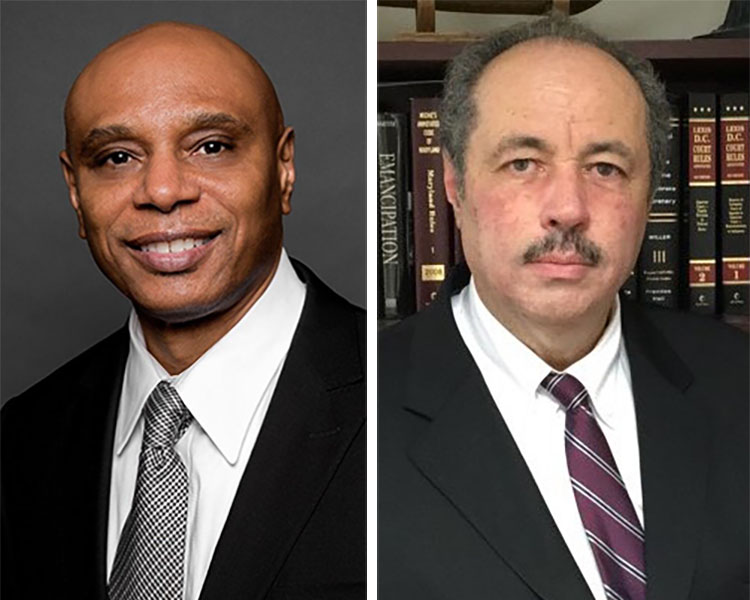Trump's attacks on courts undermine judicial independence

Kevin D. Judd and Keith Watters.
President Donald Trump has a well-published history of criticizing the judicial branch and expressing a lack of confidence in our courts and judges. Under the U.S. Constitution, the judiciary plays an essential role to ensure that our laws are strictly adhered to and that our civil liberties are protected.
President Trump’s attack on the judiciary poses the question: Does the Constitution effectively safeguard judicial independence?
Historically, the system of checks and balances was first proposed in the Federalist Papers and later implemented with the ratification of the Constitution in 1787. Federalist Paper No. 47, written by James Madison, stated that “accumulation of all powers, legislative, executive, and judiciary in the same hands … may justly be pronounced the very definition of tyranny.” The Founding Fathers, well-versed in British history and seeking protection from another ruler who may become too powerful to the detriment of the country, prioritized judicial independence as a fundamental tenet of American democracy. Without a system of fair courts, the citizens could only rely on the executive and legislative branches to create laws without an independent body to interpret their fairness.
In June 2016, then-candidate Trump suggested that U.S. District Judge Gonzalo Curiel of the Southern District of California could not be impartial when deciding the highly contested future of Trump University because of his “Mexican heritage.” Trump was equally piqued to learn that the case regarding DACA deportations amnesty would be heard in the 9th U.S. Circuit Court of Appeals. He stated: “We lose, we lose, we lose, and then we do fine in the Supreme Court. But what does that tell you about our court system? It’s a very, very sad thing.”
In June 2018, Trump again undermined the bedrock of due process by calling for the immediate deportation of immigrants without seeing a judge or having a court hearing.
While judicial independence has been an important fundamental principle since the birth of the United States, its relevance today is paramount. It is important to recognize that an independent judiciary protects all citizens. The separation of powers into equal branches of the government, first proposed in the Federalist Papers, is especially relevant today.
President Trump’s utter lack of respect and understanding of the need for an independent judiciary is exemplified when he debased Judge Curiel on racial grounds and also made ad hoc criticisms against the court of appeals. A judiciary without the faith of the executive is a danger to a free and open society. Citizens rely equally on each of the three branches of government for the administration of governmental affairs. When citizens lose confidence with the branch of government responsible for interpreting the laws, all of our institutions are diminished.
President Trump’s attacks upon judges and judicial decisions undermines the legitimacy of the courts. This diminishes the purpose of having not only a system of checks and balances, but of having a neutral court that can operate independently. Derogatory tweets and criticisms from the executive branch must not be allowed to intimidate the judiciary. For centuries, Americans have relied on fair courts to prevent government overreach and to maintain the constitutional rights of its citizens, regardless of the political motivations of the other two government branches. Allowing the federal courts to serve as an impartial and independent body free of executive interference is crucial to preserving the ideals of the United States of America.
The head of state’s disrespect and contempt for one of the bedrock principles of democracy demonstrates why an independent judicial branch is essential. The executive branch cannot usurp the judicial branch, and the executive branch should not attempt to abrogate this core constitutional structure. Our system of checks and balances has proved to be the bedrock of our democracy. The Constitution safeguards judicial independence; however, separation of powers ensures that each branch must accord the others a certain level of deference. As the Supreme Court ruled in United States v. Nixon, no person, not even the president of the United States, is above the law.
Kevin D. Judd is a board leader and legal advocate for social and economic justice for the benefit of underserved communities. He is a founder of the Law Firm of Kevin D. Judd, P.L.L.C., a boutique law firm located in downtown Washington, D.C., that primarily focuses on bankruptcy law; and he serves as an arbitrator for the Financial Industry Regulatory Authority. He is a past president of the National Bar Association and serves as a member on the Local Rules Advisory Committee for the U.S. Bankruptcy Court for the District of Columbia; serves as a board member of the Bar Association of the District of Columbia; and serves as a fellow of the American Bar Association Foundation.
Keith Watters graduated from Ithaca College with honors in 1976 and Georgetown University Law Center in 1979. Watters is a past president of the Washington Bar Association, the National Bar Association, the Bar Association of the District of Columbia, and the Foundation of the Bar Association of the District of Columbia. He also served on a number of American Bar Association standing committees throughout the years, including the Standing Committee on Ethics and Professional Responsibility, the Standing Committee on Professional Discipline, and the Standing Committee on Medical Professional Liability.




